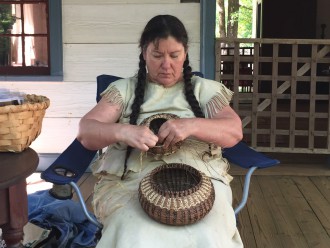For a reviled invasive species, kudzu has a surprising number of fans. Nancy Basket is one. The artist first encountered the plant when she moved to South Carolina from the Pacific Northwest in 1989.
“Nobody liked it — everybody had jokes about it,” Basket recalls. “But I’m Cherokee on my dad’s side, German on my mother’s, and I have a different outlook. Just like some people can dog-whisper, I could kind of whisper to plants, and I felt kudzu was reaching out, trying to find somebody that liked it.”

Now Basket transforms kudzu into, well, baskets, along with paper, lampshades and artwork. She’ll be teaching some of her favorite tips and techniques as part of Krazy with Kudzu, an all-day event that looks at the good, the bad and the ugly of the plant. Planned for Saturday, Aug. 12, at Chimney Rock State Park, the event includes a hands-on basket-making workshop from 10 a.m. to noon (Pre-registration is required; see sidebar, More information, for details).
Other lectures and demonstrations will take place from 11 a.m. to 3 p.m. and are included with park admission.
Bad rap
Local permaculturists Justin Holt and Zev Friedman will preach the gospel of working to reap kudzu’s bounty. Known for hosting an annual Kudzu Kamp near Sylva, the pair will discuss how they harvest kudzu vines and roots to make paper, rope, medicine and other items. They will also offer some prepared kudzu products for sale at the event.
Holt says he will explain to visitors at the August event how, by recasting our understanding of kudzu as an invader, “We can have a much richer experience of our Southern landscape.”
God save the queen
Kudzu royalty will also be on hand. The moniker “Kudzu Queen” was first used to describe Edith Edwards in a television segment filmed by Charlotte’s WBTV 30 years ago, and it stuck.
Now in her 90s, Edwards says she and her husband, Henry, began feeding kudzu to cows on their Rutherfordton farm during a drought in the early 1960s. It took another 20 years — and the gift of a kudzu cookbook from Henry’s cousin — before Edith discovered that humans could also eat the plant. Her fried kudzu leaves, she says, are “out of this world.”
Park visitors will have an opportunity to sample some of the queen’s edible kudzu treats, including her kudzu jelly.
The Edwardses don’t limit their use of the plant to feeding humans and livestock. According to Edith, kudzu’s medicinal properties make it an effective treatment for alcoholism, tobacco addiction and upset stomach. She and Henry sell baled kudzu from their farm to Chattahoochee Herbal Snuff in Alpharetta, Ga. The company combines kudzu, mint leaves and other natural ingredients to make Hooch Snuff, a tobacco-free alternative to snuff.
“It’s unbelievable, to tell you the truth, that here are these leaves that have been around all over the Southeast the last so many years, and no one had ever really gotten involved with it,” Edith says.
“Probably as time goes on, somebody will take it and go with it,” she continues with a laugh. “They may make the million that we wish we had.”
Kudzu’s dark side
Alongside its useful and even endearing characteristics, the kudzu vine presents very real problems for farmers and landowners.
Kudzu is native to China, Taiwan, Japan and India — but not to North America. The plant was introduced to the United States in 1876 and came into wider use in the middle part of the last century as a ground cover. While it excels at reducing soil erosion, kudzu also smothers native plants, blocking their nutrition and growth.
Even estimating the number of acres affected by kudzu is an all-but-impossible task, says Dillon Michael, N.C. Forest Service ranger for Buncombe County, because the plants grow so quickly and coverage varies widely from property to property. Still, he says, it’s clear that the weed is an ecological disaster for Western North Carolina.
What’s more, the plant is challenging to eradicate. Trent Duncan, a forester with the N.C. Forest Service, says his agency most often deals with kudzu removal when converting forest land to another use. Although using herbicides is the most effective approach, he says, two or three applications are necessary, and the treatment costs several hundred dollars per acre.
Jen Adams will share her approach to kudzu removal at the Aug. 12 event. She uses a combination of mechanical, chemical and biological methods in her work as a habitat restoration associate for Conserving Carolina (which previously was known as the Carolina Mountain Land Conservancy).
Mechanical control, explains Adams, refers to digging the plants out at the root. Chemical methods are another important strategy. And biological controls refer to using goats or other animals to clear areas of the plant.
To avoid confusion, Adams says, Conserving Carolina focuses solely on removing kudzu — not figuring out new ways to use it. In the Hickory Nut Gorge area, she explains, the Weed Action Coalition has been working since 2012 to control the vine. More information is available at www.wachng.org.
The group, “doesn’t promote [beneficial uses] because we don’t want people planting kudzu,” Adams says. “That’s the main concern — that they’ll be like, ‘Oh well, kudzu’s so great, we can eat it and make things out of it, so we might as well plant it on our property.’ And that just creates a whole new problem.”
Get your goat
Farmers like Ron Searcy of Wells Farm in Horse Shoe rent out goats to graze away kudzu on others’ land. While goats require much more maintenance than people realize, Searcy says, they are effective at controlling kudzu in an area over time.
Searcy agrees with Adams that kudzu is a menace. “It completely displaces what’s natural to this area,” he says. He’ll bring that message — along with a few members of his goat herd, which currently numbers over 200 — to the event, where he will discuss natural methods for controlling the plant’s spread.
While experts may differ on the best ways to approach the creeping, climbing, engulfing kudzu vine, all agree that kudzu is here to stay. Chimney Rock State Park’s event will provide visitors an opportunity to consider the plant in all its complexity.
“We’re just kind of shaking our fists at it,” saysHolt. “I think there’s an opportunity to feel more connected to our landscape by getting hands-on, working with plants.”
Editor’s note: The description of Jen Adam’s work with the Weed Action Coalition of Hickory Nut Gorge has been updated from an earlier version of this article.




Before you comment
The comments section is here to provide a platform for civil dialogue on the issues we face together as a local community. Xpress is committed to offering this platform for all voices, but when the tone of the discussion gets nasty or strays off topic, we believe many people choose not to participate. Xpress editors are determined to moderate comments to ensure a constructive interchange is maintained. All comments judged not to be in keeping with the spirit of civil discourse will be removed and repeat violators will be banned. See here for our terms of service. Thank you for being part of this effort to promote respectful discussion.